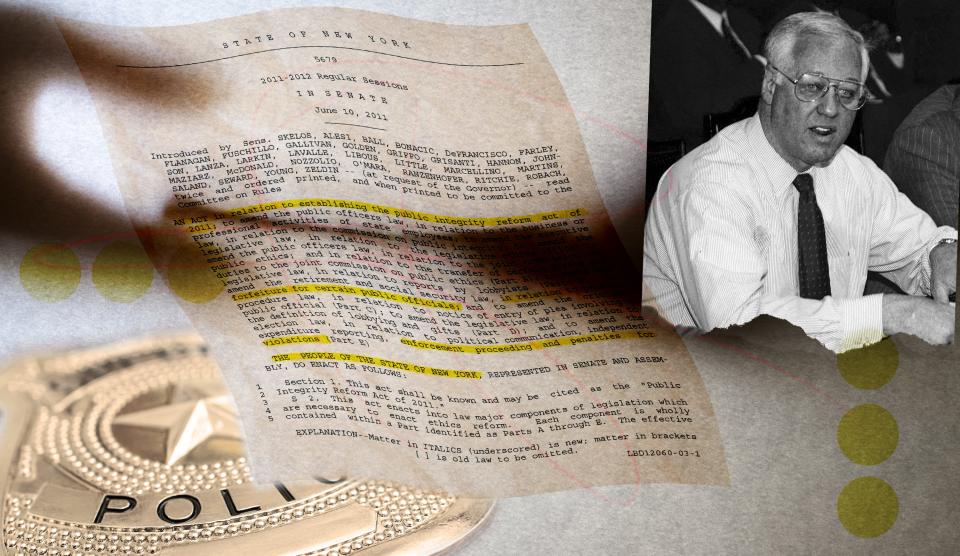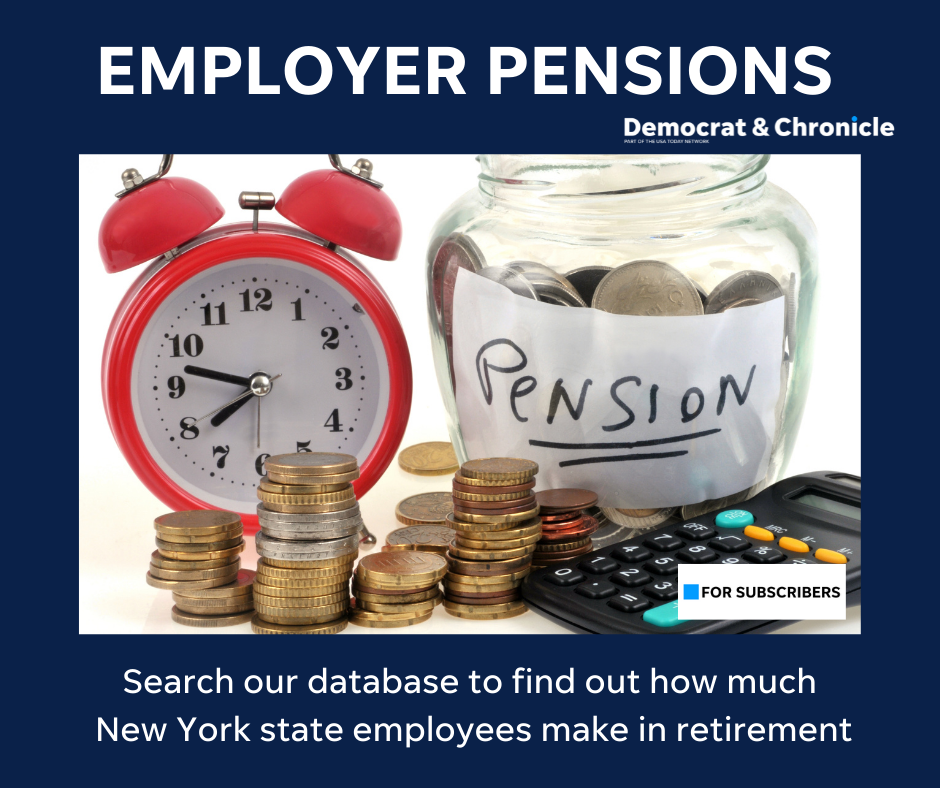When New York state lawmakers passed a sweeping ethics reform package in 2011, it was hailed as a major advancement toward eliminating corruption in Albany.
“This historic ethics reform bill is another step in restoring the public’s trust in their government,” said then-Senate Majority Leader Dean Skelos on the Senate floor during the passage of the Public Integrity Reform Act.
But a new investigation by the USA TODAY Network New York has exposed a glaring defect in the Public Integrity Reform Act: Corrupt officials were supposed to be at risk of losing all or part of their pensions. Instead, their pensions have largely been kept whole.
This fact is all the more significant given that New York state voters overwhelmingly approved an amendment to the state constitution in 2017 significantly expanding this pension forfeiture penalty.
The USA TODAY Network New York investigation found zero cases in which convicted officials have lost their pensions under these reforms.
“I’m both surprised but not surprised,” said Blair Horner, the executive director of New York Public Interest Research Group. “Every time a reform gets written in Albany it often looks too much like Swiss cheese. People can escape accountability.”

Scandal after scandal in New York. What was the answer?
In the months before the 2011 passage of the Public Integrity Reform Act, New York had been reeling from major corruption scandals involving prominent state officials. Just six months prior, state Sen. Vincent Leibell had resigned in the face of a federal investigation into whether he was extorting lawyers in Putnam County. Leibell later pleaded guilty to grand jury obstruction and tax evasion.
Just two months prior to the law’s passage, former state Comptroller Alan Hevesi was sentenced to prison for a “pay to play” scandal where he awarded a massive pension investment in exchange for foreign travel and campaign contributions.
The Public Integrity Reform Act was supposed to change all that.
The multifaceted law was aimed at tackling corruption from many angles. It created a new public ethics watchdog known as the Joint Commission on Public Ethics, it expanded financial disclosures for legislators and lobbyists and it enabled the state to claw back the pensions of felonious public officials.
In short, the Public Integrity Reform Act was an effort to show the public that New York state is “serious about giving them a government that they deserve,” said state Sen. Andrew Lanza, R-Staten Island, on the Senate floor.
It didn’t work out that way.
The joint commission was largely viewed as ineffectual and was dissolved in 2022. The bill’s two sponsors, Skelos and Assembly Speaker Sheldon Silver, would later be convicted on federal bribery charges. And the man who signed it, Gov. Andrew Cuomo, resigned from office in 2021 amid sexual harassment and corruption scandals.
Pension forfeiture had been touted as a powerful deterrent to public corruption, both when passed in 2011 and when strengthened in the 2017 statewide referendum.
And yet in either case, under the 2011 law or the 2017 amendment, it appears that corrupt officials have not lost their pensions. The state Comptroller and New York City Comptroller both told the USA TODAY Network New York that they could not find a single case of having voided an official’s pension after a corruption-related conviction.
And that’s not for want of examples:
-
Earlier this year, former town of Throop Supervisor William Tarby pleaded guilty to stealing almost $11,000 from the town for personal debts and home improvements.
-
In September, former Utica mayor and school board president Louis LaPolla was indicted by a federal grand jury for allegedly embezzling $38,000 in donations to a scholarship fund set up in his late wife’s memory. He recently pleaded guilty to state charges for using public employees to raise money for the fund.
-
In 2021, SUNY Empire State College’s former facilities director, Erik Reimann, pleaded guilty after an investigation found he had spent thousands of taxpayer dollars on personal items.
-
In 2019, former Mount Vernon Corporation Counsel Lawrence Porcari was convicted of multiple felonies for diverting $365,000 in city funds to the mayor’s criminal defense lawyers and a public relations firm.
LaPolla is getting a $3,571 per month pension. Porcari is getting $2,994 per month. Tarby retired this year and will soon be receiving a pension.
Why is it that New York officials can still collect a pension after having been convicted of a corruption-related crime? The answer, it turns out, is just as complicated as the problem. The USA TODAY Network has found that a host of factors play into why these two laws have never been used.


Prosecutors in New York won’t go after criminals’ pensions
One of the reasons why pension forfeiture has never been pursued is that the law assigns this task to the prosecuting agency. They have to act for this process to happen.
Instead of doubling down on the same individual for a second punishment, those resources could be used to pursue a new wrongdoer, said Kevin Frankel, who worked on public corruption cases at the New York Attorney General’s Office from 2016 to 2022.
“You need to go take your proof of conviction and then commence a separate action,” he said. “We’ve already got a (criminal) judgment and some sort of sentence here, so let’s move on to the next thing, rather than back up again and deal with the Comptroller’s office.”
Frankel added that the prospect of revoking someone’s pension also provided prosecutors with substantial leverage in plea negotiations. Agreeing not to pursue revocation might mean a corrupt official would be more likely to plead guilty to the underlying criminal charge.
There are other likely reasons the pension forfeiture laws go unused, including less of a focus on white-collar criminals:
-
It’s unclear if district attorneys are aware of the specifics of the statutes and how they can be used. The USA TODAY Network could find no examples of training or information provided by state agencies to prosecutors about the laws. The District Attorneys Association of the State of New York declined to respond to questions from the USA TODAY Network.
-
There is uncertainty about what the laws entail and allow. This, however, becomes a self-perpetuating issue. If the laws are never used and tested, then legal precedents aren’t created to better define the laws and their reach.
-
District Attorneys’ offices and law enforcement agencies have a heavier focus on violent and drug crimes than on public corruption or white-collar crime.
-
Federal prosecutors often tackle public corruption cases, though those prosecutions have declined in recent years in federal court. But the laws do not extend to federal prosecutions. There was once a legislative effort to allow the Attorney General’s Office to pursue pensions after a federal conviction, but the proposal did not get momentum in Albany.
Police, teachers not affected by laws
Another significant reason no public official has had their pension revoked is that two critical public professions, police officers and teachers, were written out of the law’s reach. As well, all rank-and-file municipal employees were written out of the 2017 amendment.
Former state Sen. Joe Robach, a Republican who represented parts of Rochester and the surrounding suburbs, explained that the intent of the law was to home in on “everybody that worked for government.”
But the decision to remove police officers from the pension forfeiture law has almost certainly had a major impact on its effectiveness, as they represent many cases that could otherwise be eligible for forfeiture. Since 2021, when the New York Attorney General was tasked with investigating police killings, eight police officers have been indicted and prosecuted by that office.
From 2005 to 2011, New York City police officers were arrested in 229 criminal cases, comprising a vast range of criminal charges, according to a 2016 study funded by the U.S. Department of Justice.
Police officers continue to be charged with and convicted of corruption-related crimes:
-
Last year, Thomas Loewke admitted that he tipped off the target of a huge gambling investigation to the probe. Loewke was, at the time, a New York State Police sergeant and pleaded guilty in federal court to obstruction of justice. He is receiving a pension of more than $84,000 annually.
-
Former NYPD officer Michael Bergmann was convicted of perjury and other crimes in 2019 for fabricating an assault and sending an innocent man to prison with his lies.
-
In November, Edward Longo, a former New York state trooper, pleaded guilty in connection with a fake ticket scandal, where he was accused of writing dozens of made-up traffic tickets to unsuspecting motorists.
Prosecutors not using the forfeiture law
There could be evidence that now, years after the passages of the anti-corruption measures, some prosecutors see the laws as an arrow in the prosecutorial quiver. However, those examples are still few — very few.
Bruce Karam, superintendent of the Utica City School District from 2011 until November, agreed in a plea to partially forfeit his pension. However, even that move became problematic because the New York State Teachers’ Retirement System argued that the law did not allow the forfeiture of his pension.
Karam pleaded guilty to a felony public corruption charge; he used school district money to help fund a school board political campaign and to pay for a fundraiser that had nothing to do with the schools.
However, prosecutors secured a lump-sum payment of $150,000 from Karam instead of pursuing pension forfeiture, according to Oneida County District Attorney Todd Carville.
In Steuben County, another district attorney, Brooks Baker, is eyeing pension forfeiture in the case of a village clerk accused of stealing $1.1 million in tax funds. Prosecutors allege rampant theft by Ursula Stone, the clerk and treasurer in the village of Addison in Steuben.
An audit from the state Comptroller’s Office prompted accusations that she stole school district checks and dozens of other payable to the village, as well as gave herself unauthorized pay raises, in turn boosting her salary and future pension.
“Just to put this in a little proportion, and show you the magnitude of her theft, if you take the money she’s alleged to have stolen, it would have funded the village police department for over four years,” said Nelson Sheingold, the counsel to the state comptroller, after the announcement of the arrest.
This could represent the first instance of the pension forfeiture laws being used.
Any champions for NY reform? Some say no.
Asked about the rare use of pension forfeiture, state Comptroller Thomas Dinapoli said in a statement: “Public service is a privilege and those who betray the public’s trust must be held accountable. As I have stated since I proposed pension forfeiture legislation over a decade ago, when a public official exploits their position and betrays that trust, their public pension should be at risk.”
Some advocates of more reforms in Albany say that, while crimes continue within governmental circles, the rash of corruption does appear to have been slowed or is, for now, undetected.
“It hasn’t been the same tsunami of ethical problems that happened in the decade before” the anti-corruption laws, said NYPIRG’s Blair Horner.
Former state Sen. Timothy Kennedy, who was recently elected to federal office, was a major proponent of the pension forfeiture laws during his time in the state legislature.
“Those who are convicted of violating the public’s trust don’t deserve to collect a pension, especially on the dime of hardworking New Yorkers,” he said in a statement in response to the USA TODAY Network investigation. “The pension forfeiture legislation that was advanced in Albany was intended to equip prosecutors with the ability to hold these bad actors accountable.
“While I can’t speak to the way in which this law has been enforced, I’m always open to revisiting opportunities to strengthen existing laws if we can improve their intended purpose.”
Former state Sen. Joseph Robach also wonders whether lawmakers have the willpower to ensure the anti-corruption laws are used or strengthened.
“There is nobody that seems to care about public integrity,” he said. “They want to have you believe that nothing like that could ever happen again. I don’t believe it.”
About reporting this New York investigation
To conduct its research into the state pension forfeiture laws, the USA TODAY Network New York reached out to the New York Comptroller’s Office and the New York City Comptroller’s Office, different pension systems in New York, state and federal prosecutor offices, the District Attorneys Association of the State of New York, the Attorney General’s Office, the state Office of Court Administration, numerous other organizations and agencies, and good government groups.
None could provide an instance in which a corrupt public official lost all or part of a pension under the pension forfeiture laws.
That does not mean pensions have never been affected by criminal or civil judgements. In criminal cases involving pension-eligible public officials, all or part of a pension is frequently seized for victim restitution. Crime victims also bring civil cases against convicted pensioners and are able to seize pension benefits to satisfy civil damages.
However, these types of cases only work where there is a clear, identifiable victim to whom restitution can be provided. The utility of the forfeiture law is that it allows prosecutors to go beyond this, to claw back pensions where the general public has been defrauded by an official’s misconduct.
Lawrence Porcari, the former Mount Vernon corporation counsel, was not ordered to pay any restitution after he was convicted of steering hundreds of thousands of dollars in city funds to the mayor’s criminal defense attorneys (and a PR firm). In his case, there was no clear victim, aside from the general public.
He served a brief prison sentence before his release from custody last year. Every month, he’ll continue to collect his nearly $3,000 government pension.
— Gary Craig is a veteran reporter with the Democrat and Chronicle, covering courts and crime and more. He is the author of two books, including “Seven Million: A Cop, a Priest, a Soldier for the IRA, and the Still-Unsolved Rochester Brink’s Heist.”
— Asher Stockler is a government accountability reporter for lohud.com.
— Madison Scott is a journalist with the Democrat and Chronicle who contributed reporting for this article. She has an interest in how the system helps or doesn’t help families with missing loved ones. She can be reached at [email protected].
This article originally appeared on Rochester Democrat and Chronicle: New York pensions: Corrupt officials get money despite crimes, reform

Amanda Smith is a dedicated U.S. correspondent with a passion for uncovering the stories that shape the nation. With a background in political science, she provides in-depth analysis and insightful commentary on domestic affairs, ensuring readers are well-informed about the latest developments across the United States.







